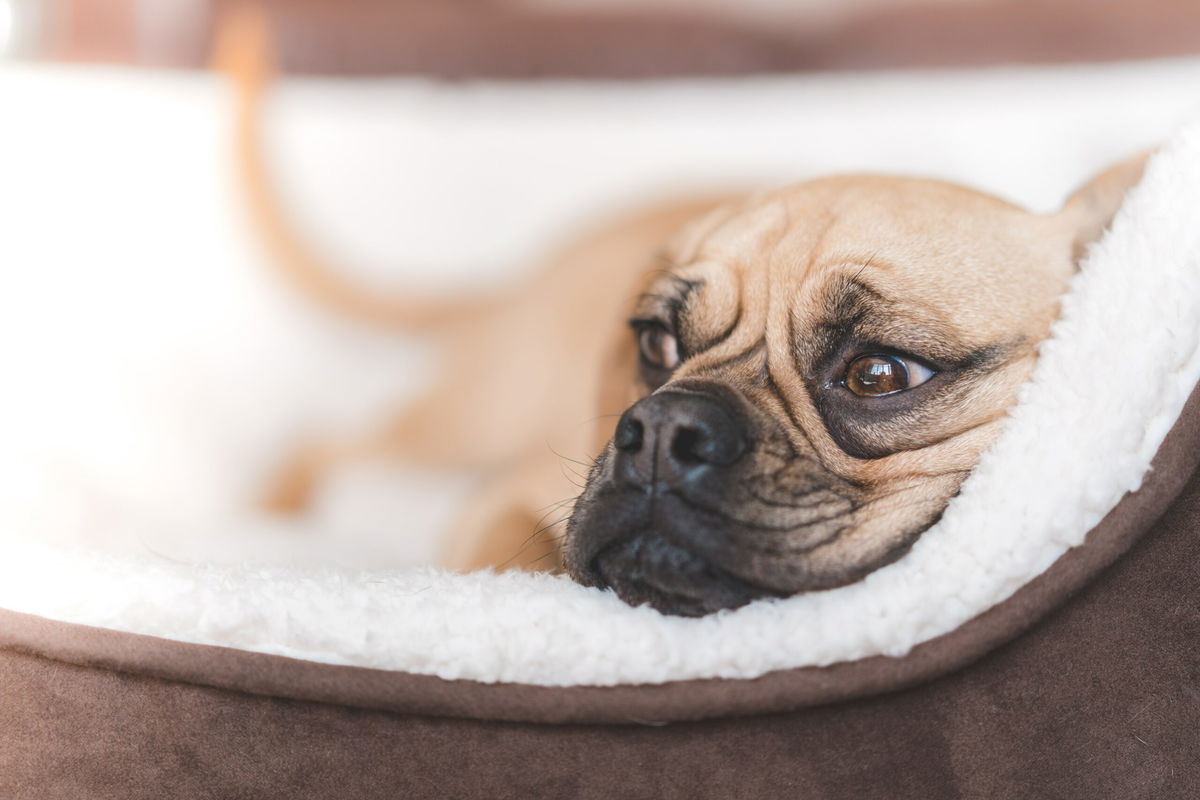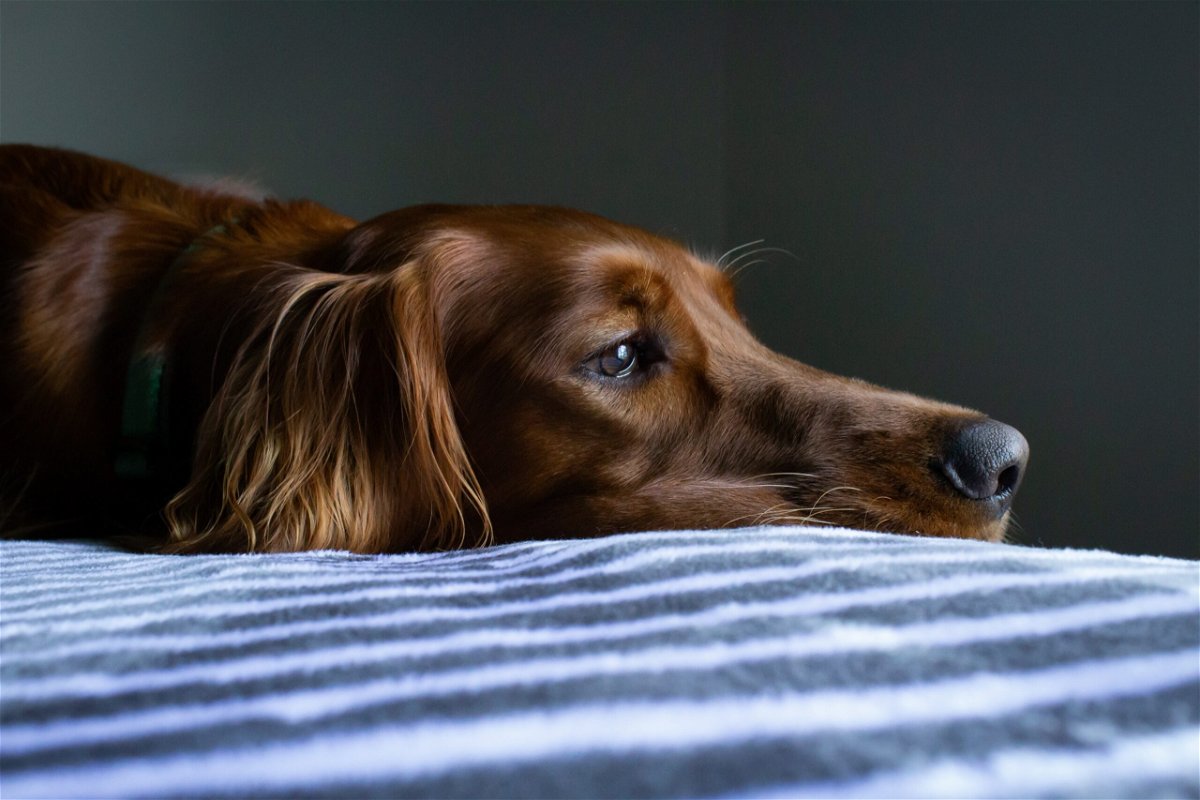We're an affiliate
We hope you love the products we recommend! Just so you know, we may collect a share of sales or other compensation from the links on this page at no additional cost to you. Thank you if you use our links, we really appreciate it!
As a long-time dog owner, you know your dog’s personality very well so new behaviors can be surprising.
Anxiety that comes on fast can be surprising and a bit alarming and it can have many causes.
In this article, we’ll look at the symptoms of dog anxiety, and the causes. How can you help your dog if they get anxious, as well as, how to prevent anxiety from developing.
First, we’ll teach you how to recognize anxiety in your dog.
Symptoms of Sudden Anxiety in Dogs
There are a couple of different types of anxiety symptoms in dogs, and knowing what anxiety looks like can give you a jump start on finding a way to manage or fix it.
Behavioral Changes
- Hiding
- Avoiding interaction
- Destruction of objects
- Aggression
- Going potty in the house
- Shaking or pacing
Physical Symptoms of Anxiety
- Dilated pupils in eyes
- Ears pinned back
- Yawning, whining, panting, drooling, licking, barking
- Change in body posture
- Shedding
There are lots of symptoms listed above, but how do you differentiate normal behavior fluctuations from sudden anxiety?
Sudden anxiety can include many of these behavioral changes in the same period, it is unlikely they will exhibit just one.
But knowing what anxiety looks like doesn’t help you know how to make it better, many triggers can cause sudden anxiety in dogs.
What Causes Sudden Anxiety in Dogs?
There are three main causes of sudden anxiety in dogs.
Change in Routine or Environment
Change can be hard for anyone, including your dog. Changes like moving to a new home, losing a pet friend or human friend, or something as simple as a change in their daily schedule.
Unfortunately, you can’t sit down and explain change to a dog. So change can be scary for them, fear of the unknown is often a cause of sudden anxiety.
Traumatic events also cause fear, they can also be a cause of anxiety.
Traumatic Events
Something as simple as loud noises can trigger anxiety, or as complex as being in a car accident.
If you don’t know your dog’s history they may have unknown traumatic events in their past, such as abuse or mistreatment before being surrendered at a shelter.
Trauma can change how your dog reacts, going through a scary (for them) situation has consequences.
Even fireworks or thunderstorms can bring on anxiety but maybe your dog’s anxiety has a medical reason rather than behavioral.

Medical Issues
Anxiety may be the result of several medical issues. If your dog is in pain or discomfort it may develop sudden anxiety, they won’t understand why they are in pain, it is a change in their life.
Neurological disorders can also cause sudden anxiety. Disorders that are often brought on by age such as:
- Dementia: Confusion and decreased brain capacity.
- Cognitive Dysfunction Syndrome: a neurological disease that results in decreased blood flow to the brain.
Finally, your dog may be struggling with hormone imbalances. The adrenal gland in your dog has a big job. It regulates all the hormones that your dog produces.
At times it may not function properly, releases too much adrenaline and cortisol (the fight-or-flight hormones), and can cause anxiety.
Now you know why your dog may have gotten their sudden anxiety. So how can you help your dog if it exhibits anxiety symptoms?
How Can You Help Your Dog With Sudden Anxiety?
There are several steps you can take to help your dog if they develop sudden anxiety, we’ll talk about them in the order you should use them.
Assess the Situation
First, see if you can find the cause. Did you make any changes in your dog’s life recently? Did their environment change? Was there a change in routine? Did you add a new pet or human to their world?
Identifying the cause can help you find a solution.
Create a Calm Environment
Giving your dog a safe space it can retreat to when it feels overwhelmed can be extremely helpful, give them a comfy bed with lots of toys and water.
Making a space specifically for your dog will give it a sense of security.

Maintain a Familiar Routine
Giving your dog a routine to look forward to can help reduce uncertainty and fear. Make sure you include feeding, walks, playtime, and bedtime. If your dog always knows what’s coming next it will feel more secure.
Offer Distractions
Keep your dog stimulated, toys and puzzles can keep your dog entertained and their brain occupied.
Decreasing the amount of time they have to feel stressed, you can even find toys that contain treats so your dog gets rewarded for keeping itself occupied.
Use Positive Reinforcement
Using positive reinforcement to reward your dog during calm moments is important, encouraging relaxation with treats and praise will slowly teach your dog to do it more.
Practice Short Departures
If your dog specifically has separation anxiety you should practice short departures, leave your house briefly, and then come back.
Gradually increase the time you’re gone until your dog is more comfortable with it. You are teaching your dog that departures are temporary and you will always come back.
Consider Desensitization
Desensitization can be a good tool, start with small versions of the triggers that bring on anxiety then reward them when they are calm.
An example would be making louder and louder noises for a sound-sensitive dog, as you continue giving treats they are learning that sounds are okay and won’t hurt them.
Consult a Veterinarian
You’ve tried all the steps above but you still can’t seem to cure your dog’s sudden anxiety. Then it might be time to call a veterinarian, they can help you rule out any possible medical conditions.
Your veterinarian will be able to give you advice and they can recommend medications or supplements or they’ll be able to refer you to a behaviorist.
Your dog has some of the symptoms of anxiety. But what is severe anxiety?
What Does Severe Anxiety in Dogs Look Like?
Severe anxiety in dogs is a step above mild anxiety your dog will exhibit panicked symptoms:
- Panting
- Pacing
- Escape behavior
- Racing around in fear
- Aggression
- Diarrhea
- Licking or biting its own body
- Tail chasing and circling
If your dog has severe anxiety it is important to find professionals to support you, veterinary behaviorists can help diagnose the root cause of your dog’s anxiety.
Then they’ll determine a strategy to fix the anxiety, trainers can help you train your dog to avoid some of the anxiety symptoms. The two working together can help you give your dog a more relaxed life.
If training and a behavior specialist aren’t working for your dog, it may be time to look into medications. Some common anxiety meds your vet may prescribe:
- Amitriptyline
- Buspirone
- Clomipramine
- Dexmedetomidine
- Diazepam
- Fluoxetine
- Lorazepam
- Paroxetine
- Xanax
- Zoloft
All this is great. But is there a way to prevent anxiety from developing in the first place?
How to Prevent Dogs From Developing Anxiety
Several good practices will help your dog avoid anxiety.
Finding a puppy that has already had quite a bit of socialization is a good start, then put in the work to do as much socialization as you can when you get them.
Then create a stable routine so they are confident in their life and give lots of positive reinforcement for good behavior. Make the world an exciting place for them, not a scary one.
Finally, make sure you get them regular vet checkups so they aren’t at risk for medically induced stress.
There is no guarantee that your dog won’t develop anxiety, but doing these four things is a great preventative measure.
FAQs
Why is my dog so anxious on walks?
Your dog may be anxious if they are experiencing lots of new things on their walk if there are other unfamiliar animals or if there are lots of loud noises.
Is it possible for a previously confident dog to develop sudden anxiety?
Yes. Your dog may have experienced an unknown traumatic event at any time you weren’t with them. They may have developed a medical cause or they may have changed their routine or environment.
Can I use over-the-counter calming products without consulting a vet?
There are many over-the-counter products that are vet–recommended. It never hurts to check with your vet though.
Why is my dog suddenly anxious in the car?
Your dog may be anxious after a change in its routine, environment, or household. Assess the situation to determine what has changed and see if you can fix it.
Conclusion
When you know your dog’s behavior and temperament very well it can be a shock when it changes.
The good news is that there are legitimate reasons for sudden onset anxiety, and there are also many good solutions. Many anxious dogs have a good chance of improving if you follow the steps above.
Laura is the founder of Furs'n'Paws. She is a also a pet writer and expert with more than 20 years of experience of working with dogs and cats. She developed a very strong love for animals at a young age. Her passion led her to establish a thriving pet sitting and dog walking business in Dubai. As an expert in pet training, behavior, and nutrition, Laura is committed to helping pet owners and pet lovers by offering high-quality information on a wide range of topics.




No responses yet